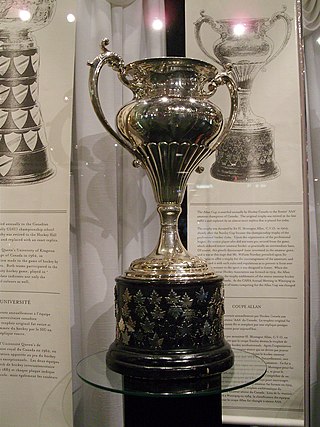
The Allan Cup is the trophy awarded annually to the senior ice hockey champions of Canada. It was donated by Sir Montagu Allan of Ravenscrag, Montreal, and has been competed for since 1909. The current champions are the Dundas Real McCoys, who captured the 2023 Allan Cup in Dundas, Ontario.

Claude Copeland Robinson was a Canadian ice hockey and sports executive. After winning an intermediate-level championship as captain of the Winnipeg Victorias in 1905, he served as secretary-treasurer and as vice-president of the Victorias. He coached the Victorias to a Manitoba Hockey League championship in 1909, and felt that his team could have competed for the newly established Allan Cup, despite that challenges from senior ice hockey teams were accepted only from Eastern Canada at the time. The Victorias won the Allan Cup by default in 1911, when the Toronto St. Michael's Majors refused to play, then successfully defended four challenges for the trophy.
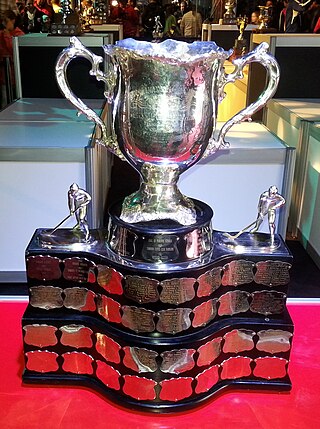
The 1963 Memorial Cup final was the 45th junior ice hockey championship of the Canadian Amateur Hockey Association (CAHA). The George Richardson Memorial Trophy champions Niagara Falls Flyers of the Ontario Hockey Association in Eastern Canada competed against the Abbott Cup champions Edmonton Oil Kings of the Central Alberta Hockey League in Western Canada. In a best-of-seven series, held at Edmonton Gardens in Edmonton, Alberta. Edmonton won their 1st Memorial Cup, defeating Niagara Falls 4 games to 2.

The 1962 Memorial Cup final was the 44th junior ice hockey championship of the Canadian Amateur Hockey Association. The George Richardson Memorial Trophy champions Hamilton Red Wings of the Ontario Hockey Association in Eastern Canada competed against the Abbott Cup champions Edmonton Oil Kings of the Central Alberta Hockey League in Western Canada. In a best-of-seven series, held at the Guelph Memorial Gardens in Guelph, Ontario, Kitchener Memorial Auditorium in Kitchener, Ontario, and the Barton Street Arena in Hamilton, Ontario, Hamilton won their 1st Memorial Cup, defeating Edmonton 4 games to 1.

The 1961 Memorial Cup final was the 43rd junior ice hockey championship of the Canadian Amateur Hockey Association (CAHA). The George Richardson Memorial Trophy champions Toronto St. Michael's Majors of the Ontario Hockey Association in Eastern Canada competed against the Abbott Cup champions Edmonton Oil Kings of the Central Alberta Hockey League in Western Canada. In a best-of-seven series, held at the Edmonton Gardens in Edmonton, Alberta, St. Michael's won their 4th Memorial Cup, defeating Edmonton 4 games to 2.

The 1957 Memorial Cup final was the 39th junior ice hockey championship of the Canadian Amateur Hockey Association (CAHA). The Flin Flon Bombers won their first Memorial Cup championship by defeating the Ottawa Junior Canadiens four games to three in a best-of-seven final series held at the Whitney Forum and the Regina Exhibition Stadium. CAHA second vice-president Gordon Juckes oversaw the scheduling and discipline for the national playoffs.

The 1948 Memorial Cup final was the 30th junior ice hockey championship of the Canadian Amateur Hockey Association (CAHA). The George Richardson Memorial Trophy champions Barrie Flyers of the Ontario Hockey Association in Eastern Canada competed against the Abbott Cup champions Port Arthur West End Bruins of the Thunder Bay Junior Hockey League in Western Canada. In a best-of-seven series, held at Maple Leaf Gardens in Toronto, Ontario, Port Arthur won their 1st Memorial Cup, defeating Barrie 4 games to 0.

The 1942 Memorial Cup final was the 24th junior ice hockey championship of the Canadian Amateur Hockey Association (CAHA). The George Richardson Memorial Trophy champions Oshawa Generals of the Ontario Hockey Association in Eastern Canada competed against the Abbott Cup champions Portage la Prairie Terriers of the Manitoba Junior Hockey League in Western Canada. In a best-of-five series, held at Shea's Amphitheatre in Winnipeg, Manitoba, Portage la Prairie won their 1st Memorial Cup, defeating Oshawa 3 games to 1.

The 1941 Memorial Cup final was the 23rd junior ice hockey championship of the Canadian Amateur Hockey Association (CAHA). The George Richardson Memorial Trophy champions Montreal Royals of the Quebec Junior Hockey League in Eastern Canada competed against the Abbott Cup champions Winnipeg Rangers of the Manitoba Junior Hockey League in Western Canada. This was the first-ever Memorial Cup to feature a team from Quebec. In a best-of-five series, held at the Montreal Forum in Montreal, Quebec and at Maple Leaf Gardens in Toronto, Ontario, Winnipeg won their 1st Memorial Cup, defeating Montreal 3 games to 2.

Allan Wilfrid Pickard was a Canadian ice hockey administrator, who served as president of the Canadian Amateur Hockey Association (CAHA) from 1947 to 1950. When Canada opted out of the 1947 Ice Hockey World Championships and decided not to participate in the 1948 Winter Olympics, Pickard felt that Canada was obliged to send a team due to its place as a top hockey nation, and nominated the Ottawa RCAF Flyers who won the gold medal for Canada and lived up to the requirements of the Olympic Oath as amateurs. Despite disagreement with the International Olympic Committee, he sought for the International Ice Hockey Federation to adopt the CAHA definition of amateur in the face of increasing difficulty in selecting the Canada men's national ice hockey team.
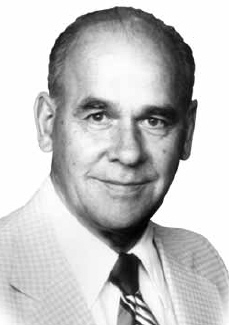
Frederick Page was a Canadian ice hockey administrator and ice hockey referee. He originated from Port Arthur, Ontario, where he played junior ice hockey, refereed locally and later at the Memorial Cup and Allan Cup competitions. He was a league executive in Fort William, then served as president of the Thunder Bay Amateur Hockey Association from 1958 to 1962. He was elected second vice president of the Canadian Amateur Hockey Association (CAHA) in 1962, and rose up the ranks to be its president from 1966 to 1968. Page wanted the CAHA to gain more control over its affairs, and become less dependent on the National Hockey League (NHL). Under his leadership, the NHL ended direct sponsorship of junior hockey teams. He was instrumental in negotiating the revised agreement for the NHL Amateur Draft in 1967, and later served as co-chairman of the resulting joint player development committee.
Jimmy Dunn was hired as commissioner of the Manitoba Junior Hockey League (MJHL) in May 1964. The league had been reduced to four teams based in the Greater Winnipeg area after the withdrawal of the Brandon Wheat Kings and the Fort Frances Royals. The MJHL transitioned from a draft of players in the Greater Winnipeg Minor Hockey Association, into a system where each team chose players from a set geographic district. The new "zoning" arrangement was planned to be in effect for three seasons to stimulate more localized interest in junior hockey and aimed to keep teammates together from the minor hockey level to the junior hockey level. Dunn supported the change and noted that the concept had produced forward lines on previous Memorial Cup championship teams from Winnipeg. The Charlie Gardiner Memorial Trophy series was revived as a preseason tournament for the league's teams. Dunn reached an agreement to televise MJHL games on CJAY-TV, and the league experimented with playing games on Sunday evenings instead of afternoons to increase its attendance and avoid competing with televised football games. Dunn requested to the Canadian Amateur Hockey Association (CAHA) that the MJHL waive its bye into the Abbott Cup finals and its playoffs champion meet the Thunder Bay Junior A Hockey League champion in the first round. He felt that the loss of gate receipts from a bye was a financial hardship for the MJHL, and shorten the league's playoffs to accommodate the change approved by the CAHA.
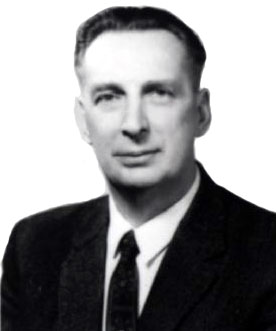
Hanson Taylor Dowell was a Canadian ice hockey administrator and politician. He served as president of the Canadian Amateur Hockey Association from 1945 to 1947, and was the first person from the Maritimes to serve on the national executive. He sought to have the Canadian definition of amateur recognized at the World Championships and the Olympic Games for the benefit of Canada's national team, and negotiated the merger of the International Ice Hockey Association into the Ligue Internationale de Hockey sur Glace. He served as president of the Maritime Amateur Hockey Association from 1936 to 1940, and later as treasurer of the Maritimes and the Nova Scotia Hockey Associations for a combined 30 years.

The 1937 Allan Cup was the Canadian Amateur Hockey Association (CAHA) national senior ice hockey championship for the 1936–37 season. The Sudbury Tigers defeated the North Battleford Beavers 3 games to 2.

Lloyd Thompson Pollock was a Canadian ice hockey administrator and businessman. After running the Windsor City Hockey League, he assisted in the foundation of the Windsor Softball League, and later started a junior ice hockey league in Windsor, Ontario. He was a cofounder of the International Hockey League in 1945, and founder of the original Windsor Spitfires junior team in 1946. He served as president of the Ontario Hockey Association (OHA) from 1961 to 1963, welcomed the Montreal Junior Canadiens into the OHA when it was divided by the Metro Junior A League, and supported measures to preserve the Northern Ontario Hockey Association.
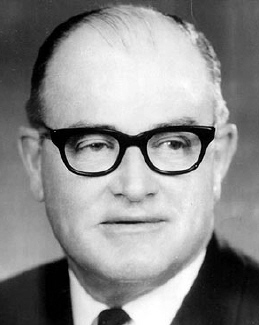
Frank Forest Sargent was a Canadian sports executive in ice hockey and curling. He served as president of the Canadian Amateur Hockey Association (CAHA) from 1942 to 1945, and was president of the Dominion Curling Association (DCA) from 1965 to 1966. He was the first person to be elected to more than two terms as CAHA president, and the first to be president of two national amateur sporting associations in Canada.
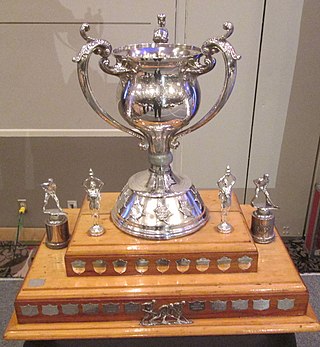
The Saskatchewan Junior Hockey League was a junior ice hockey based in Saskatchewan and Manitoba from 1948 until 1966. It operated under the jurisdiction of the Saskatchewan Amateur Hockey Association. Two of its teams won the Abbott Cup as the junior champions of Western Canada, and the Flin Flon Bombers won the Memorial Cup as the national junior champion of Canada in 1957. Frank Boucher served as commissioner of the league from 1959 to 1966. The league disbanded when five of its eight teams joined the newly formed Canadian Major Junior Hockey League.
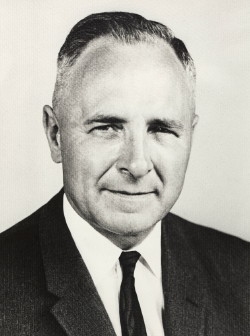
Arthur Thomas Potter was a Canadian ice hockey administrator. He was president of the Canadian Amateur Hockey Association (CAHA) from 1962 to 1964, and oversaw the establishment of a permanent Canada men's national ice hockey team after he decided that sending the reigning Allan Cup champion to international competitions was no longer the answer. He felt that Canada needed discipline to handle Cold War tactics and propaganda at the Ice Hockey World Championships, sought to give its best players to develop as a team, and supported a plan by Father David Bauer to assemble a team of amateur student athletes to complete at the 1964 Winter Olympics.

Lionel Fleury was a Canadian ice hockey administrator who served as president of the Canadian Amateur Hockey Association from 1964 to 1966. Under his leadership, the Canada men's national ice hockey team transitioned from student athletes coached by Father David Bauer into a year-round national team program. Fleury welcomed the Newfoundland Amateur Hockey Association as a new branch member of the national association in 1966, and changed the format of the Memorial Cup playoffs in Eastern Canada from an elimination bracket into a round-robin format to reduce travel costs and address concerns of imbalanced competition. He sought an end to the National Hockey League system of sponsoring amateur teams by replacing it with a draft of players who had graduated from junior ice hockey, and negotiated for a new agreement that was realized after his term as president concluded.
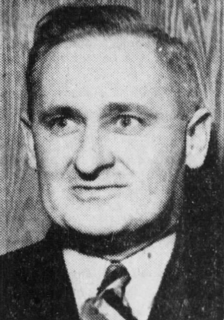
Robert Norman Dawe was a Canadian sports executive. He originated as an ice hockey referee for minor ice hockey games in Verdun, Quebec, before becoming involved in the administrative aspect of sports. He was a member of the local YMCA executive, served as secretary of the Verdun Playgrounds Commission from 1923 to 1948, and organized the Verdun Hockey Board. He served as a member of the Quebec Amateur Hockey Association (QAHA) executive committee for 23 seasons, and helped establish a provincial referee's board in 1936. In Montreal and Verdun, he was involved in girls' fastpitch softball. He served as the Montreal Ladies' Major Softball League president from 1940 to 1945, then was president of the Verdun Ladies' Softball League from 1945 to 1947. He began organizing Canadian football in 1945, when he established the Verdun Juvenile Football League and served as president.












